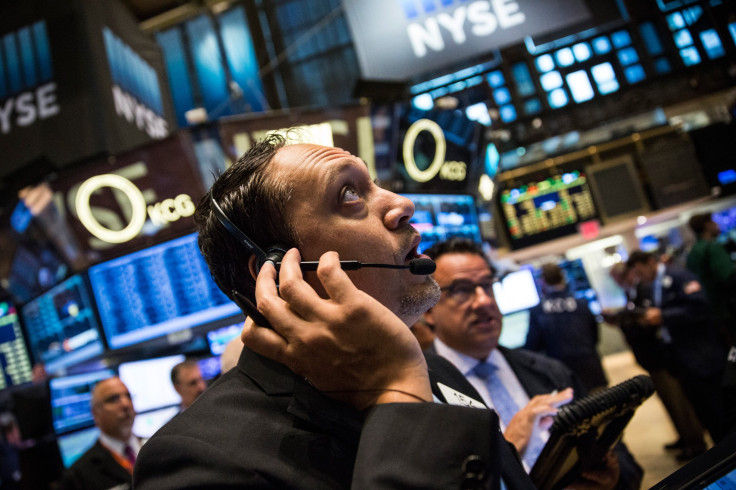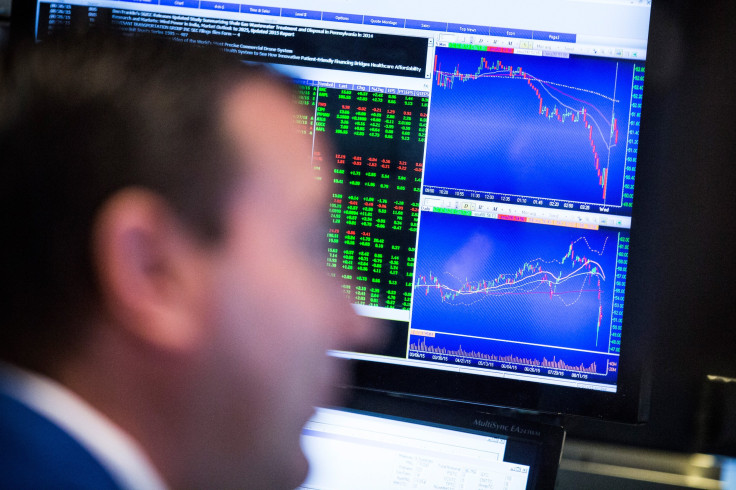Stock Market Mayhem Renews Calls For Controversial Financial Transaction Tax

The turbulent times in global stock markets are giving rise a controversial idea: Tax the traders. Proponents say slapping a tiny tax on financial transactions would discourage the sudden sell-offs and volatile trading that are causing the Dow Jones Industrial Average's wild swings this week.
The tax proposals take particular aim at the firms that use high-frequency trading techniques to reap huge profits in a matter of milliseconds. Automated, computer-based trading accounts for roughly half today's trade volume, exposing the markets to increasing instability, critics claim.
"The algorithms are locked into approaches that exaggerate the swings in the market," said James Henry, an adviser to the Tax Justice Network and a senior fellow at Columbia University’s Center for Sustainable International Investment. In the wake of this week's market mayhem, Henry and others are renewing their calls for a financial transaction tax that they say would make for more thoughtful trading--and bring in much-needed federal revenue. On Wall Street, it could mean a tax on every trade.
"It’s in the interest of everyone who wants to invest to have a stock market that is not driven by triggers and is based on longer-term, fundamental factors," Henry added. "Anything that will slow down this automatic trading is healthy for the system."
The push to tax financial assets first emerged in the 1970s, when Professor James Tobin, an American economist, proposed taxing foreign exchange transactions to reduce volatility in the currency markets. Proposals today would extend the levies to all traded assets, or at least those handled by high-frequency traders. Banking officials and industry groups staunchly oppose the policy, which they say would unfairly raise banking costs, discourage trading and shrink the markets, in turn slamming the overall economy.
The recent support for financial transaction taxes has grown in response to the 2008 financial crisis. Consumers and their advocates, worried about excessive greed on Wall Street, saw the taxes as a way to rein in harmful financial practices, penalize the wealthy to protect ordinary citizens -- leading some to call it the "Robin Hood tax." Some proposed tax strategies would place 75 percent of the liability on the top fifth of traders, the Tax Policy Center estimates.
Sen. Elizabeth Warren, D-Massachusetts, one of the leading critics of large banks, has repeatedly expressed support for a financial transaction tax.
At an April conference on banking reform in Washington, she accused high-frequencing trading firms of introducing "greater volatility into our financial markets through arbitraging gimmicks that add no value to the economy." Speaking at the event, she called for a tax that would target those traders and leave "regular mom-and-pop investors" unscathed. "Such a tax would push sophisticated trading firms to invest in companies for the long haul and strengthen our markets," she added.
Sen. Bernie Sanders of Vermont, who is seeking the Democratic nomination for U.S. president, has similarly proposed a financial transaction taxes on trades of stocks, bonds, derivatives and other securities. Sanders’ plan, unveiled in May, would use the revenues to make public college tuition free for students.
Tax proposals vary in size and target. But the Tax Policy Center, an independent think tank in Washington, estimates that a 0.01 percent excise tax, spread over trillions of transactions, could raise $185 billion over 10 years.
The tax-backers argue the fee is too tiny to hinder global financial markets; after all, a 0.01 percent tax on a $1,000 transaction would equal just a dime, they point out. But they say it’s strong enough to penalize the high-frequency traders and level the playing field for regular investors, who suffer from hair-pulling stress when their portfolios swiftly vanish, then suddenly reappear, as they did Monday.

High-frequency traders "ought to pay at least some kind of cost for all the hysteria that they’re creating and all the noise the system is generating," Henry said. "It doesn’t help the middle class, because we have to worry about the anxiety. That can’t be good for society as a whole."
Financial markets in at least nine countries are already subject to varying types of transaction taxes, including in Britain, Switzerland, Singapore, Hong Kong and Brazil. Eleven countries in the European Union agreed to collectively adopt such a tax in 2013, although the policy has stalled amid fierce opposition from Europe's banking industry.
In a recent letter to EU finance ministers, the European Banking Federation and three regional banking associations warned that tax supporters were "dangerously underestimating its significant economic impact, which will seriously damage financial stability in Europe and in the Eurozone."
Critics point to the results in France and Italy, which have their own financial tax regimes. In Italy, average daily trading in Italian stocks dropped 29.7 percent in January and February 2014, compared to the average for the same period in 2013, Credit Suisse trading strategy analysts said last year. France saw the average daily turnover in French stocks dip by 9.2 percent in the first 20 months since the tax was introduced, the analysts found in their 2014 report.
In the United States, critics of a financial transaction tax warn of economic stagnation. They say that, despite the pro-tax crowd’s claims that only high-frequency traders would be hit, every investor would feel the pang of a tax.
Firms using high-frequency trading techniques "have played an instrumental role in making markets more efficient for investors," Bill Harts, CEO of the Modern Markets Initiative, an advocacy group for high-frequency traders, wrote in an Aug. 4 op-ed. "Thanks to their technological capabilities, these firms are able to quote investors tighter prices to buy and sell stocks, which means they pay less to complete their orders. A loss of principal-trading firm activity will translate into higher costs for investors."
Perhaps the question is whether investors are willing to trade higher fees for fewer ulcer-inducing moments in the markets.
© Copyright IBTimes 2024. All rights reserved.





















